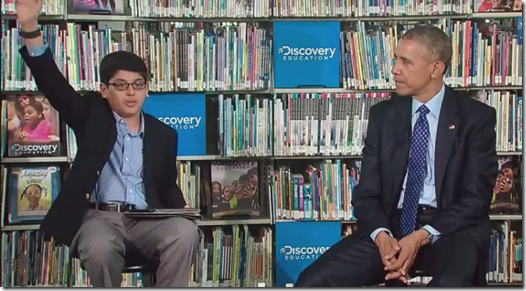President Obama Gets "Schooled" By A Sixth Grader
Last Thursday, President Obama was interviewed at the Anacostia Library in Washington, D.C. for a “Virtual Field Trip” event that was broadcast into classrooms around the world.
His interviewer was sixth-grade student Osman Yaya. At one point, Osman asked the president to define “writer’s block” and offer suggestions to help students get past it.
President Obama took 3 minutes and 18 seconds to answer the question. During that time, he solicited some input from the students in the room—but for the most part, he held the floor and delivered an unnecessarily long and boring response.
Most interviewers—particularly those still in grade school—wouldn’t have the audacity to shut the President down. Most interviewers, however, are not Osman Yaya.
(The full exchange is here, and begins at 24:38.)
After the more than three-minute presidential filibuster, Yaya finally interjected and told the President, “I think we’ve sort of covered everything about that question.” That light moment wasn’t a big deal, and Mr. Obama handled it with humor. But it got me thinking about executives and other people in power.
It strikes me that just because elected representatives, CEOs, celebrities, and other executives are powerful people, many audiences will listen attentively—or at least politely— to what they have to say. And that can give powerful people a distorted view of their own speaking skills.
In other words, there are two reasons people might listen to a powerful person’s presentation:
- Because they’re interested in what the powerful speaker has to say; or
- Because they recognize that the powerful person is speaking mere feet from them, and that a lack of attentiveness might be considered impolite (at best) or could noticed by the powerful person and have repercussions (at worst).
I suspect that many powerful people have had different combinations of groups one and two present during different speeches. President Obama, for example, can be an electrifying orator at moments, so it’s not hard to believe that many people in his audiences are in the former camp. But he can also be dreadfully boring—as he was in this exchange—and in this case, I suspect the audience was shifting into the second camp.
The problem for many executives is that it’s sometimes challenging to tell the difference between genuine interest and polite interest. So I’ll leave the executives reading this post with this question: Do you know which camp your audiences are in?
Don’t miss a thing! Click here to instantly join our mailing list and receive free media training and public speaking tips.



